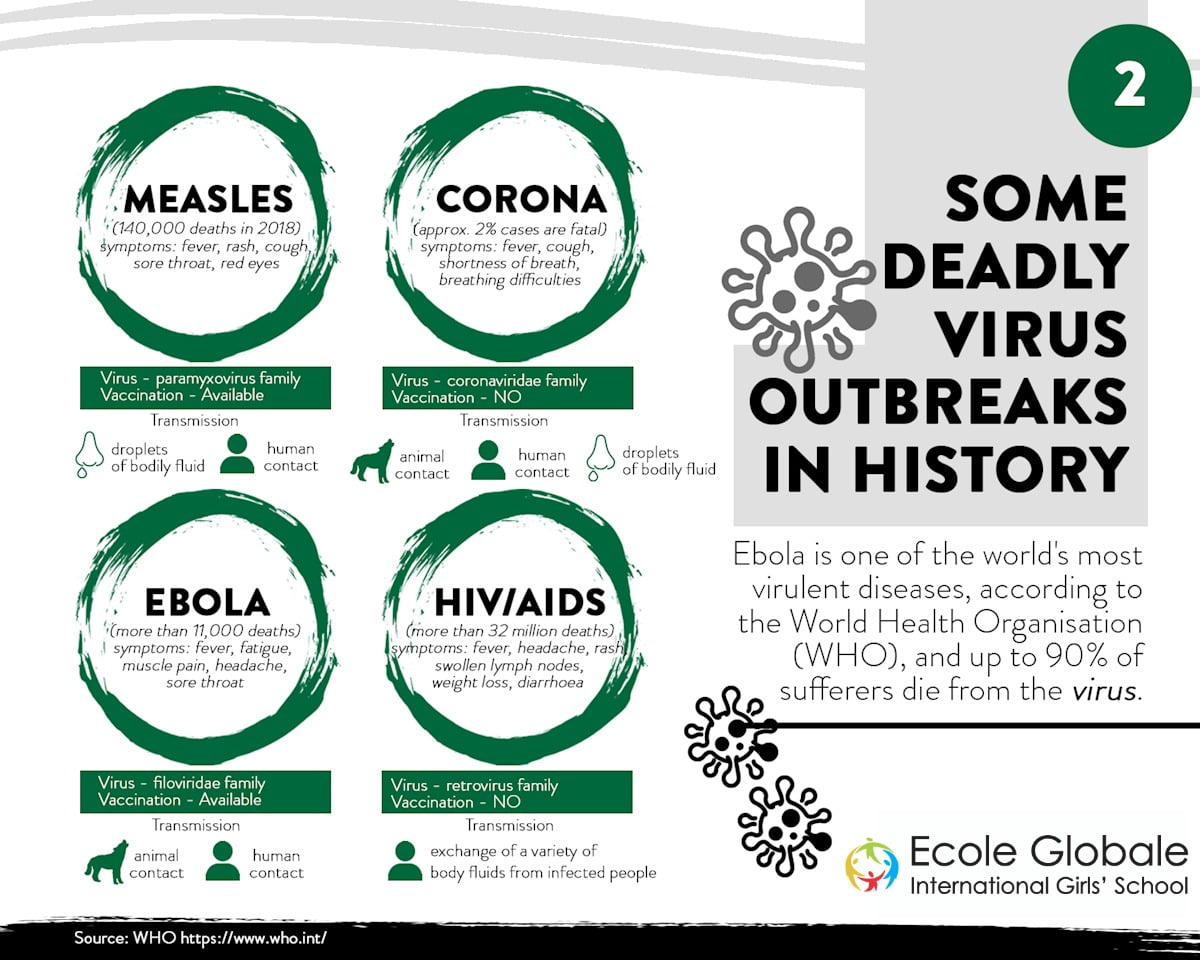SOME DEADLY VIRUS OUTBREAKS IN HISTORY
MEASLES
Measles is a sporadic viral infection that is serious for kids but can be prevented by a vaccine. The disease is spread through the air by respiratory droplets produced from coughing.
VIRUS – Paramyxovirus family
SYMPTOMS
The symptoms will appear after 10 to 14 days of exposure. These are
- Fever
- Rash
- Cough
- Sore throat
- Red eyes
TRANSMISSION
- Human contact
- Droplets of bodily fluid
VACCINATION
Is available
EBOLA
Also called Ebola hemorrhagic fever can cause severe bleeding and organ failure, which can ultimately lead to death.
It’s one of the world’s deadliest diseases, according to the world health organization; ninety percent of the cases of people who have Ebola virus result in death.
VIRUS
Filoviridae family
SYMPTOMS
Initial symptoms
- Fever
- Fatigue
- Muscle pain
- Headache
- Sore throat
Later symptoms
- Vomiting
- Coughing blood
TRANSMISSION
- Animal contact
- Human contact
VACCINATION
Is available
HIV/AIDS
HIV/AIDS termed as human immunodeficiency virus or immunodeficiency syndrome attacks the body’s ability to fight with the infections.
VIRUS
Retrovirus family
SYMPTOMS
- Fever
- Headache
- Rash
- Swollen lymph nodes
- Weight loss
- diarrhea
TRANSMISSION
- Exchange of body fluids from infected people
- Sexual contact
VACCINATION
No vaccination is available.
CORONA
Coronavirus is an infectious virus that causes disease in animals, and now some of its forms have jumped to infect humans.
COVID-19 is similar to severe acute respiratory syndrome(SARS), which can infect around 80% of cases leading to mild infections. And many cases might also be asymptomatic, and thus it is becoming so difficult to control it.
VIRUS
Coronaviridae family
SYMPTOMS
People may be affected by the virus for 1 to 14 days before showing any visible signs.
Some of the common symptoms are
- Shortness of breath
- Cough which gets more severe over time
- Tiredness
- Fever which gradually increases in temperature
These symptoms can become more severe in some people
- Blue face or lips
- Persistent pain or pressure in the chest
- Excessive drowsiness
WHO IS AT RISK?
In general, people of all ages are at risk from coronavirus, but some people are more vulnerable to becoming severely ill from the virus. These are
- Older people
- People with pre-existing medical conditions such as asthma, diabetes, and heart disease.
But this doesn’t mean that other people apart from this bracket are safe. Everyone needs to take preventive measures to stay away from the virus.
TRANSMISSION
- Person to person
It’s believed that the leading cause of transmission is from one person to another.
It can transmit through people coming in close contact with each other.
Through respiratory droplets produced by the already infected person when he coughs or sneezes.
People can also transmit the disease even if they are asymptomatic.
- Contaminated surface
It may be a possibility that the virus can also transmit to a person if he comes in contact with a cover or any object which has been contaminated by the virus and then touches his eyes, mouth, or face.
PREVENTION
Even though scientists are involved in research of coronavirus disease, no vaccine has been developed yet for preventing the disease.
So what we can do best from our side to protect ourselves from the disease and stop it from spreading to others is to follow some guidelines.
- HANDS-Wash your hands regularly for 20 sec with soap or alcohol-based hand wash and water.
- ELBOW-Cover your nose and mouth with a disposable tissue or flexed elbow when you sneeze or cough.
- FACE-Don’t touch your eyes, nose, and mouth if your hands are not clean.
- SPACE- Avoid close contact with people who are ill.
- HOME-Stay at home if you can. And if you don’t feel well, then self isolate yourself from others.
VACCINATION
No
TREATMENT
No specific medicine has been developed yet for preventing or treating COVID-19. These are the steps you can follow according to your symptoms.
Self-care
If you have mild symptoms of COVID-19, stay at home isolated until you have recovered. You can recover if
- Take Rest and sleep well
- Keep yourself warm
- Drink plenty of liquids
- Use a room humidifiers
- Take a hot shower
Medical treatment
If your condition worsens and you have a fever, cough, and difficulty in breathing, then you should go for seeking medical care.
Also, tell them about your recent travel or any last contact with people.









